Northern Norway offers a different experience to the rest of the country. From dramatic landscapes to picturesque fishing villages, here is the very best of Norway's Arctic region.
There's a lot to pack into a trip to Norway. From the fjords to the big cities, the country offers so many attractions. Yet when people ask me for my advice, I often point them northwards.
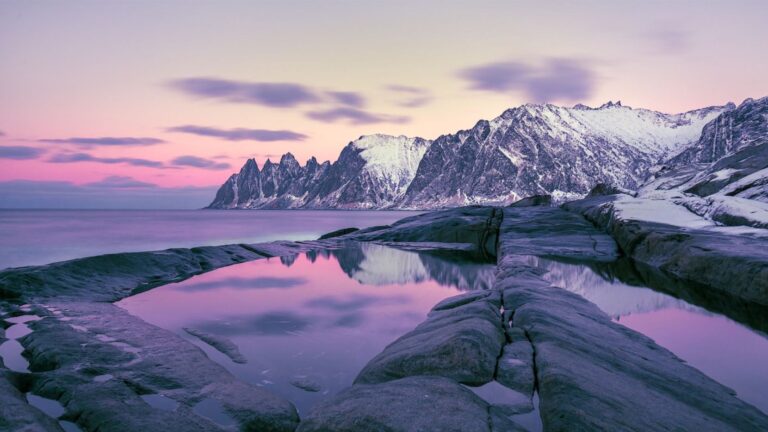
That's because Northern Norway is stunning, perhaps the most picturesque part of the country after the fjords. My own preference is to visit by ship, but however you travel, the north will offer something for you.
Are you planning a trip to Scandinavia? If so, you probably already have a bucket list. Even so, here's my take on some of the best places to visit in northern Norway that may be new to you.
Introducing Northern Norway
It never looks like it on a map, but the north of Norway is vast. Distances are long and that could be why traditional cultures have remained in place for so long. That means it's impossible to see everything in this article on just one trip, without dedicating weeks to the task.
The region is also incredibly varied. The mountains of Lofoten offer some of the most incredible scenery on the planet. But the area east of Tromsø is largely open and barren. It's wild and wonderful in a completely different way.
If you're looking for an easy way to see some of the region's best sights, consider a coastal voyage.
Doing so means you will miss some inland attractions, but you'll get a fantastic view of Lofoten, Tromsø and some other highlights. If you visit in the winter, it's a great way to catch the northern lights too.
Despite their location at the north of Norway, many places including Lofoten and Tromsø are not as cold as you might expect. That's thanks to the warming waters of the Gulf Stream.
However, there are significant climate variations between the coastal areas and the inland region. If you're heading to Kautokeino and Karasjok, wrap up warm!
Read more: This German Photographer Captures Northern Norway's Raw Beauty
As for where you should go, it's impossible to cover everything. I'm sure many people in the comments below will be moaning that I didn't include X or Y!
But this article isn't meant to be an exhaustive list. It's simply my personal recommendations of the best places to visit. Use it as a resource to inspire your own trip planning. Enjoy!
Senja island
Norway's second largest island Senja rivals the Lofoten islands for spectacular scenery. But there's one crucial difference: there's way fewer visitors!
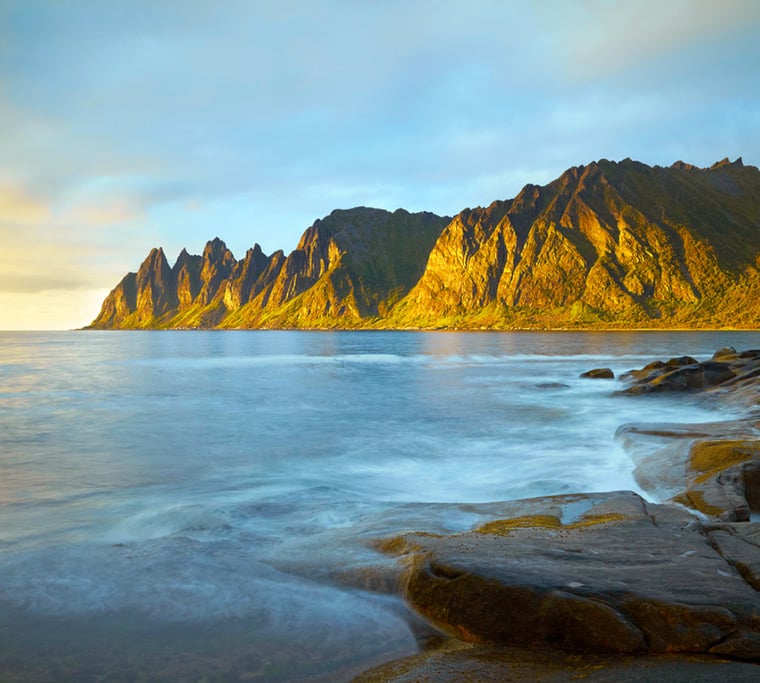
To fully appreciate the peace and stunning sights, you should plan to spend at least a day, preferably two, and be prepared to hike.
A good place to start is by driving the national scenic route. The narrow road twists and turns along fjords giving you sight of steep, ragged mountains plunging deep into the water. The only trouble you'll have is to decide where to stop for a walk!
If you bump into a local on your wanders, there's plenty to ask them about. Storytelling has a long tradition on Senja. Ask about Senjatrollet–the troll seen both on land and at sea—and how the Ausa mountain acquired a face and eyes.
If you have time on your travels, call in to Husøy island in the Øyfjord. This windswept isle is home to a few hundred hardy souls, some of whom live in houses stayed with wires to withstand the fierce winds. Husøy island is connected to Senja by a breakwater.
Nyksund, Vesterålen
Many Norwegian fishing villages have been through turbulent cycles of activity, but few more stories are starker than Nyksund's. Once a thriving home to hundreds of cod fishermen, Nyksund was abandoned in the 1970s as the industry struggled.
Learn more: Interested in more information about Norway’s Vesterålen? Check out these Vesterålen Islands Photos
The village was saved by an enterprising German. Soon enough the village had life again, with accommodation, cafés, and galleries and even a population of locals, albeit only in the summer. It takes a long time to drive there, but it's well worth it. Even at the height of summer, Nyksund still feels like the end of the world.
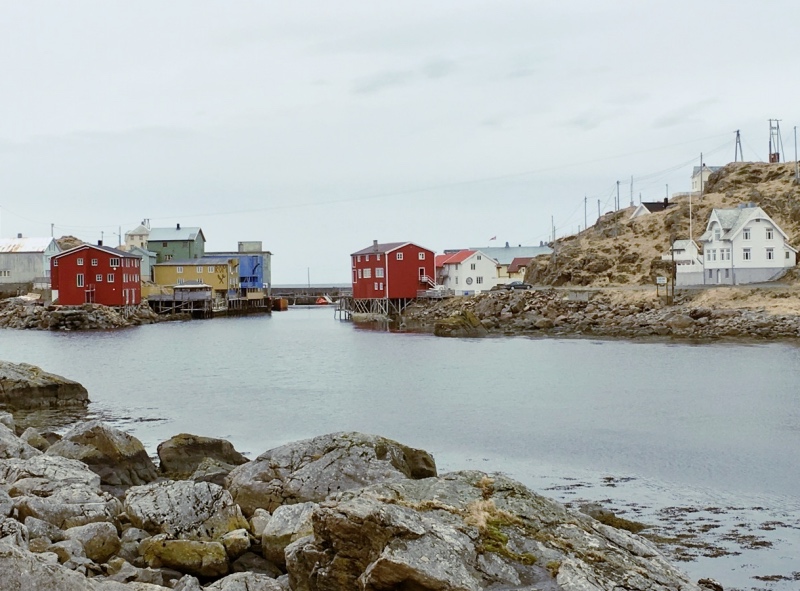
One of the well-known names to enjoy the area is none other than Queen Sonja. She's even lent her name to the hiking trail over the mountain to the neighbouring village of Stø.
The Dronningruta trail (which means Queen’s Route in Norwegian) is actually two routes that run between Nyksund and Stø, forming a circle; both routes are well marked. A straightforward 5km walk tours the sandy beaches of the coastline, while experienced hikers can tackle the tougher 14.5km route over the mountain.
Sail into the Trollfjord
Svolvær is the launch point for tours to the Trollfjord, one of Norway’s lesser known yet most dramatic fjords.
While you could spend days exploring the Sognefjord alone, the Trollfjord is just 2km long and extremely narrow. You enter the fjord at its narrowest point, just 100 metres wide. Surrounded by towering mountains, this is no trip for claustrophobics.
The fjord received national notoriety in 1890 when it was the site of a standoff between the industrial steam ships and traditional open-boat fishermen about access and fishing rights to the fjord.
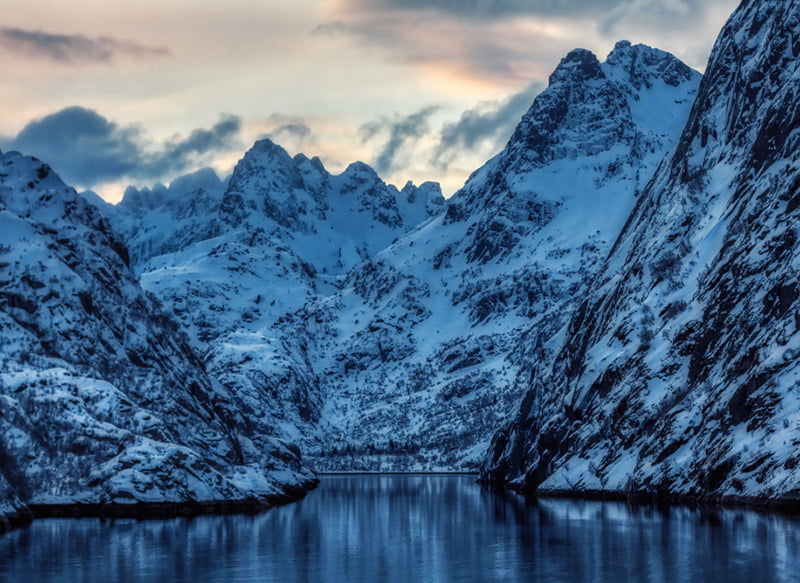
It's a scene that was captured in a famous painting on display in the art museum of Svolvær.
Today the area is known just as much for its local population of sea eagles as for the plentiful stocks of fish. Captains often use fish to lure the breathtaking birds close to the ship for a close-up view. Unlike some of the other Norwegian fjords, there is no road access.
Kirkenes
Kirkenes is notable for its Russian influence, which extends to the bilingual street signs and many shop advertisements.
But it's also known for being one of the most heavily bombed cities during the Second World War. In the town square, a War Mothers Monument commemorates the effort of the town’s women during the conflict.
The intimate andersgrotta bomb shelter is built into the bedrock under the town. It gives visitors a feel for what it must have been like during the hundreds of occasions local residents had to take refuge.
Access to the shelter is by pre-arrangement only, so that a short film and local guides can add context to your surroundings. Tours run daily for groups in the summer season, but individual places can be booked in advance with the Kirkenes Snow Hotel.
Tromsø's Cable Car
To fully appreciate the spectacular Arctic setting of Tromsø, take the city's cable car. This recently upgraded facility whisks visitors up Storsteinen mountain, 421 meters above sea level.
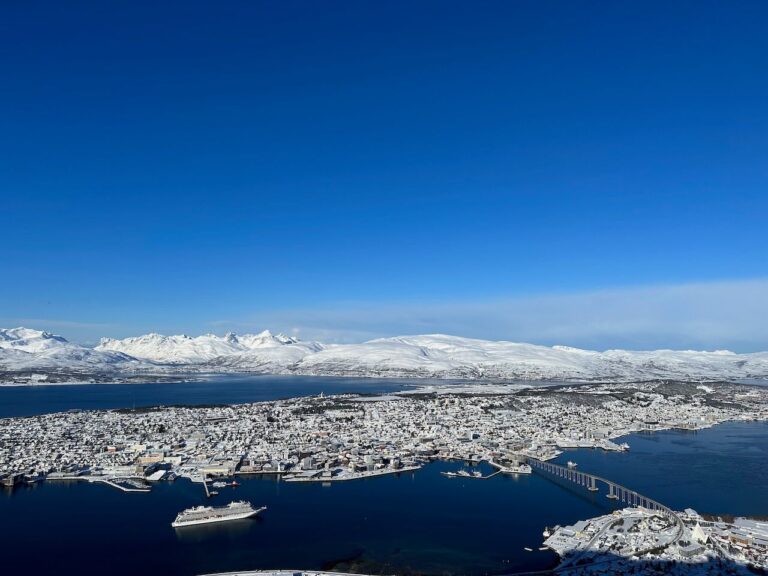
In the winter, it’s a popular place for hunting the northern lights. In the summer, many visitors make the trip just before midnight to enjoy the experience of the midnight sun. Wrap up warm, because it gets chilly up here pretty much anytime of the year!
For the fitter, the Sherpa staircase (sherpatrappa) is a great alternative to the cable car. The set of 922 stone steps were built by Nepalese mountain road workers to reduce erosion on the existing path.
The witch monument in Vardø
Vardø is known for the witch trials in the winter of 1662–1663, although people had been accused and killed for many years before that. About 150 people were executed for sorcery in the region over a period of 40 years, including many Sami men.
In 2011, a memorial was built on Vardø as part of the Varanger scenic route. The striking Steilneset memorial commemorates those killed along with other cases of genocide.
The burning chair and memorial hall were designed by artist Louise Bourgeois and the architect Peter Zumthor.
Sami culture in Kautokeino & Karasjok
The Sami people are a very visible characteristic of Finnmark county in northern Norway. The indigenous people are spread over the north of Norway, Sweden, Finland, and Russia.
Many visitors are spellbound by the vivid costumes, outdoor lifestyle, and folk songs known as joik, compared by some to the traditional chanting of some Native American cultures.
Although visible across northern Norway, the Sami culture really comes to the forefront in Kautokeino.
About four in five people speak Sami as their primary language of everyday life in this small town. One in three Kautokeino residents work in the reindeer business, which has sustained the Sami people for years and continues to do so today.
About 80 miles away, the equally small town Karasjok is home to the striking Sami Parliament. Set amid the pine forests of Karasjok, the Parliament building is clad in Siberian larch to blend in with its surroundings.
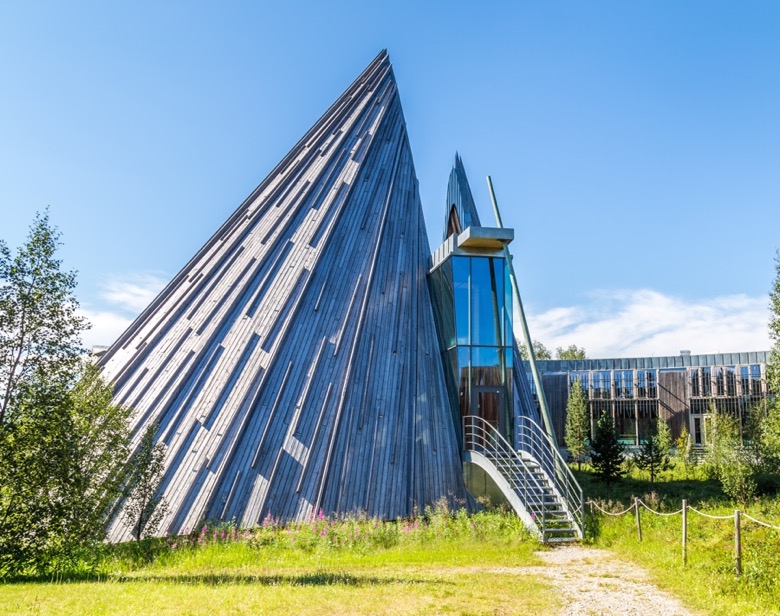
Opened in 1989, the Parliament acts as an institution of cultural autonomy for the Sami people. 39 representatives are elected every four years.
The responsibilities of the Parliament include the management of the national government’s Sami Development Fund, the development of the Sami language, protection of cultural heritage sites, and development of Sami teaching aids.
A total of 14,000 people in Norway are registered in the Sami electoral register. To be eligible for inclusion, you must have at least one great-grandparent who speaks or spoke Sami. Curiously, you must also attest to “feeling” Sami.
Visit Norway's northernmost point
I say the northernmost point rather than the North Cape (Nordkapp), because, well, it's complicated! Choose for yourself which place you consider to be Norway's northernmost point. As most people do head to the Cape, let's start there!
This iconic destination attracts hundreds of thousands of visitors every year. The reason is simple to understand if you arrive on a clear day.
The view from the plateau really does make it feel like you are standing on the edge of the world. Yet the rest of Magerøya island also offers stunning views and an isolation that you won’t find at Nordkapp.
Given its location at over 71 degrees north, weather can be highly unpredictable, and thick fog can often obscure the otherwise beautiful view across open ocean and make driving the E69 highway difficult and dangerous. For these reasons, planning ahead is essential on any visit to the cape.
A modern visitor centre is home to a panoramic movie of the variable weather conditions and birdlife year-round.
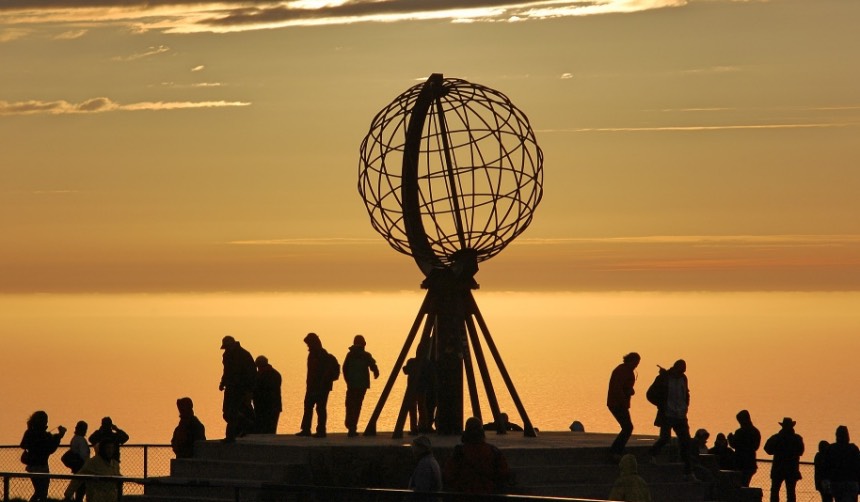
There's also a gallery, a small chapel, and most importantly in this part of the world, clean public restrooms! The center also contains what has to be one of Norway’s largest gift shops.
Å: the end of the road in Lofoten
The enjoyable road trip in Lofoten along the E10 ends abruptly in a car park in the ancient fishing village of Å. Today, Å functions as a living museum.
Founded by the Moskenes History and Museum Society, the main function of the Norwegian Fishing Village Museum has been to preserve the fishing village rather than to build anything new. The old boathouse has been converted to hold most of the museum’s exhibitions, but the whole village is an exhibition.
Don't miss the 19th-century stone oven bakery that still produces the bread and aromatic cinnamon buns sold in the village café.
Other buildings worth a look include the former cod liver oil factory, the forge, and the boathouse. Each one contains exhibitions detailing what life was like in each particular building.
The original 19th-century grocery shop still functions as a shop today, selling local food, literature, and groceries to the small number of local residents and holidaymakers. You can even stay here. Considering the small size of Å, there's a lot of places to stay.
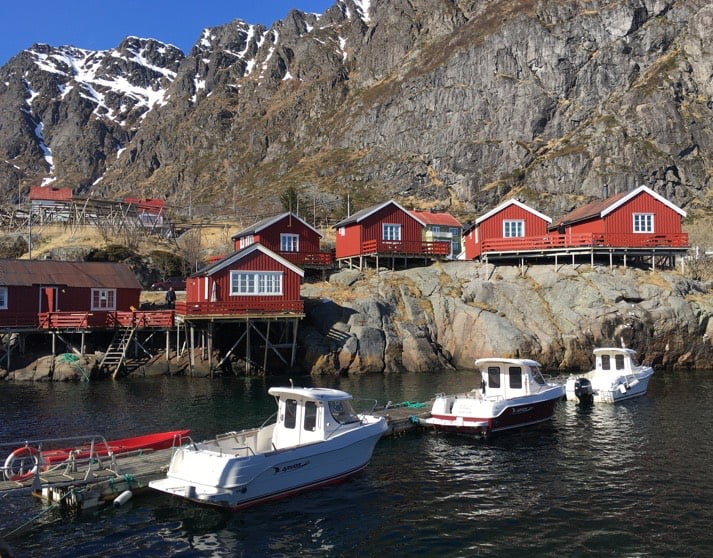
This makes the village a popular choice with travellers. That's especially true for those starting or ending their trip with the nearby ferry to the mainland from Moskenes.
The whirlpools of Bodø
Unlike the northern lights, the Saltstraumen maelstrom is a natural phenomenon that runs to a timetable! That's due to the predictable movement of the moon in relation to earth. Approximately every six hours, up to 400 million cubic meters of seawater is forced though a 150-metre-wide strait.
As gravity pushes water through the narrow strait, water speeds reach up to 40kph, forming whirlpools. When the current is at its strongest, the difference in water levels between the two sides of the strait can be up to a metre, easily visible with the naked eye.
While not as powerful to watch as a waterfall or white-water rapids, Saltstraumen is nevertheless a fascinating demonstration of the power of nature. The impressive backdrop of the Børvasstindene mountain range adds to that feeling.
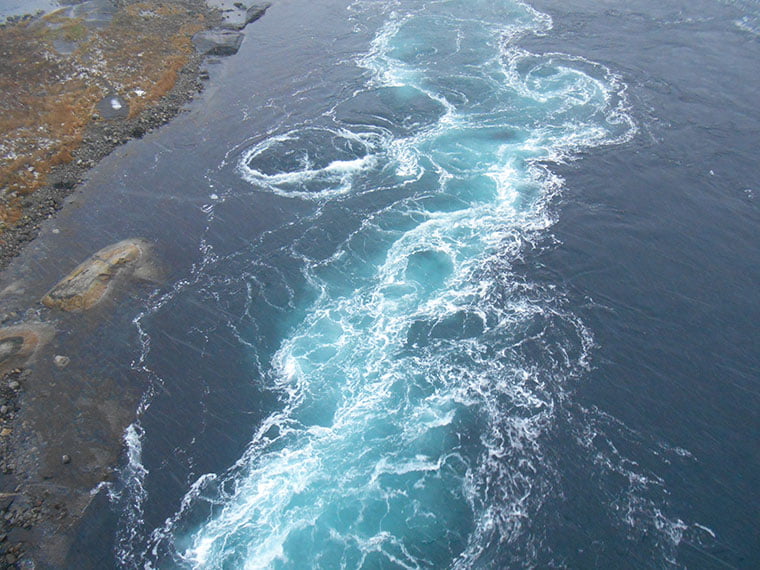
Once you're done, Bodø itself is worth a few hours of your time. The city is enjoying its year in the spotlight as European Capital of Culture in 2024, so expect a lot going on throughout the year.
Birdwatching on Røst
Last but absolutely not least, the islands of Røst. Despite all the remote places on this list, Røst has to be the most remote of them all.
This tiny group of islands is located more than 100km from the mainland and around 40km from Å in Lofoten. Despite its remoteness, driving here is possible thanks to the daily ferry service from Moskenes and Bodø.
The sole reason the community of 500 people exists here is the traditional production and export of stockfish. A sports hall, restaurant and festival carry the name Querini, a 15th-century sailor from Venice whose shipwreck on Røst lay the foundation for the industry that still exists almost 600 years later.
The ruins of a 19th-century stone church stand on the northern coastline, while the current one can seat more than half the islands’ population.
Helgeland
At the southern end of Northern Norway, the Helgeland Coast, often considered one of the most beautiful coastal stretches in Norway.
Visitors can explore the archipelago of over 12,000 islands, offering opportunities for kayaking, island hopping, and scenic boat trips.
A highlight here is the Træna archipelago, a remote yet vibrant fishing community dating back to the Stone Age. Check out this article and video I made on a recent visit to Træna to find out more.
The Seven Sisters mountain range, with its distinctive peaks, is a must-see for hikers seeking breathtaking views. Helgeland is also known for its cultural heritage, including the unique Viking burial sites at Alstahaug and the UNESCO-listed Vega Archipelago.
Elsewhere in Northern Norway
Chances are, I haven't mentioned your favourite place! That's because the region is vast and there's so much to see. With that in mind, I hope this article gives you some ideas for planning your next trip north of the Arctic circle. Some other ideas for you include:
Alta: An otherwise ordinary town is home to these spectacular rock engravings from thousands of years ago.
Narvik: Another important location during World War II. Several naval battles were fought over control of the ice-free harbour. Another important aspect to Narvik, both then and now, is the rail link to Kiruna in Sweden.
Sortland, Vesterålen: Not a place I'd recommend for a long stay, but it's worth a stop if you're passing through on the way to Nyksund. Check out the town's blue buildings and the curious story behind them.
Svalbard: I didn't include the Arctic archipelago in this article because it's so far away! But if you have the time and the money (it's an expensive place to visit, even by Norwegian standards), Svalbard is an incredible experience. The main settlement Longyearbyen can be reached via picturesque flights from Oslo and Tromsø.
Snow hotels: Another expensive but memorable option is to spend the night in one of the region's snow hotels in Alta or Kirkenes. They are not as cold as you might think!
What's your favourite place to visit in northern Norway – and why? Let us know in the comments below.
If you enjoyed this post, why not share it on Pinterest so others can enjoy it too? We've got just the pin for that. Just hit those social sharing buttons to get started.



As always David, this is a most interesting presentation on Northern Norway and should inspire everyone to visit if not in person but by reading more about the places that you have shown. Kirkenes, the turn around area for the Hurtigruten is very interesting and I just read a book titled, “Fire & Ice” by Vincent Hunter about the invasion of Northern Norway during WWII. What great people live there and still appreciate how the Russians helped during that time.
The rock carvings at Alta should be added to the list, along with the neighboring museum!
How about
Visiting a remote place in Northern Norway. A three hrs and forty- five minutes ride from Alta is a place called Oksfjørd. A scenic and picturisque place. And to add from it try to explore the island of Hasvik where you can find wild blueberries, cloudberries and edible mushrooms. Oh how i love these places I have been to.
Northern Norway is on my list to see. There are many interesting things attractive for ne.Sami peoples,Kirkenes,Alta, Karasjok ,Hammerfest are amongs my worth places on my list.Thank your for your information about Northern Norway. l wish Also for future for your country, a rail conection from Narvik at least to Alta must be. Also between Bodo to Narvik.Because Norway has enough money for this.NSB.Powerfull company for İnwestment.Greetings from Türkiye.
The first time I was in Norge was 1955 with my mother to visit her relatives and friends in Brevik and Oslo also my Paternal grandparents in Notteroy I have been on the Hurtigruten twice once in May ( I wanted to be in my parent’s hometown of Brevik for the 17th of May also toured the Diplomis ice cream factory before the cruise thanks to my Brevik cousins. The 2nd time in September. We were on Brekke tours Scenic and historic 25 years ago and we loved Roros after the Telelaget tour if Telemark 54 years ago I ordered and bought my East Telemark bunad in Notodden We hope to go on the Telelaget tour again 3rd tour this summer!
Good planning is essential for travels in the Arctic. Many visitors underestimate the distances, weather, transport options and possible delays. Get in touch with the tourist offices (I work at one) and they will give practical advice. Hiking is only a summer activity and summer is very short.